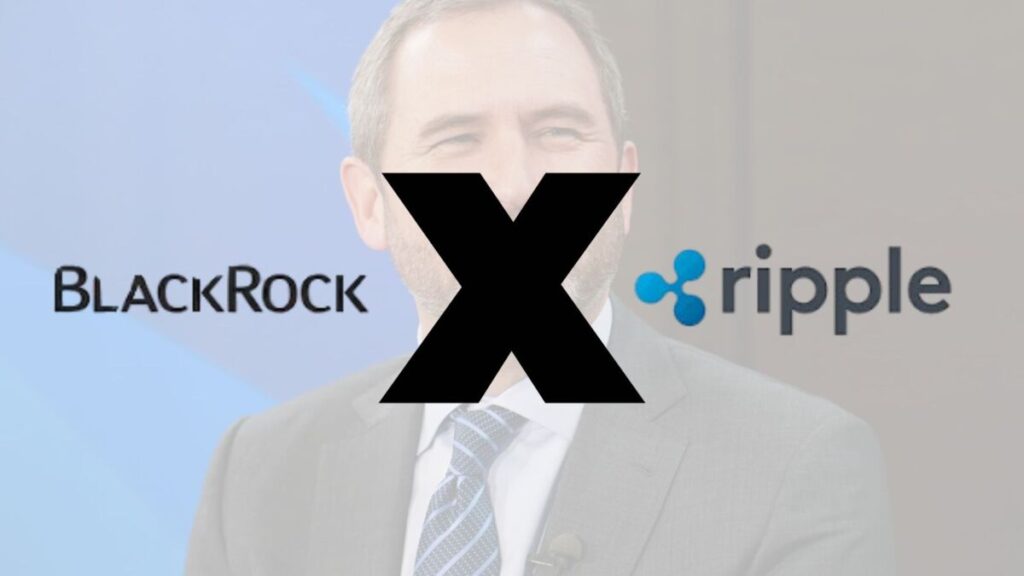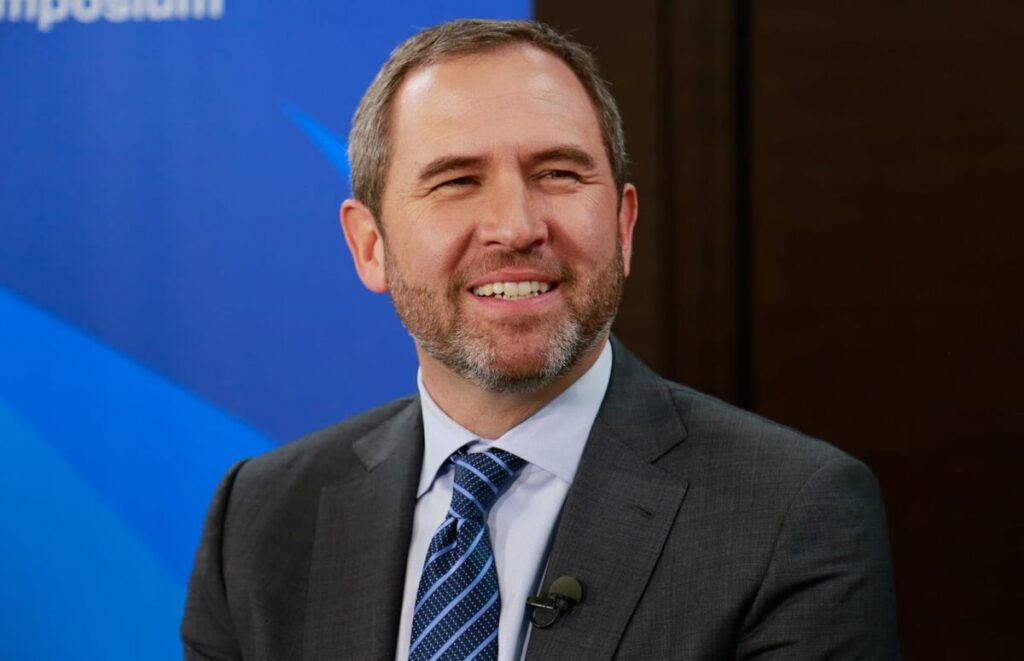In a recent interview on Bloomberg Crypto, Ripple CEO Brad Garlinghouse made a statement that could have far-reaching implications for the future of cryptocurrency. Ripple may be teaming up with BlackRock, the world’s largest asset manager, to launch an XRP exchange-traded fund (ETF) in the United States. Garlinghouse’s comment, “We believe it aligns well with the interests of the XRP community,” has sparked excitement and intense speculation across the crypto industry.

Such a collaboration between Ripple, the company behind XRP, and BlackRock could signal a monumental step forward in the mainstream adoption of cryptocurrency, particularly for XRP, which has been at the center of regulatory and legal challenges for years. If the rumors come to fruition, an XRP ETF could reshape not only the XRP ecosystem but also the broader cryptocurrency landscape.
The Ripple-BlackRock Connection
BlackRock’s entry into the cryptocurrency space has already drawn significant attention. The firm’s launch of a Bitcoin ETF proposal earlier this year was viewed as a landmark moment for the institutional adoption of cryptocurrencies. As a financial behemoth managing trillions of dollars in assets, BlackRock’s interest in digital currencies signals that the asset class is becoming increasingly legitimate in traditional financial markets.
Ripple, on the other hand, has long been one of the most influential blockchain companies, primarily due to its development of the XRP Ledger and XRP token. Ripple aims to facilitate faster and cheaper cross-border payments by leveraging its blockchain technology. Despite the long-standing legal battle with the U.S. Securities and Exchange Commission (SEC) over whether XRP constitutes a security, Ripple remains a dominant force in the crypto space.
The partnership between Ripple and BlackRock, if confirmed, could marry the blockchain expertise of Ripple with the institutional influence of BlackRock. Together, they would have the potential to establish a new kind of crypto ETF, one that could broaden access to XRP, legitimize it among institutional investors, and push forward the agenda of greater regulatory clarity for the cryptocurrency sector.
The Ripple-BlackRock XRP ETF: A Potential Game-Changer
An XRP ETF would offer several compelling benefits for both the cryptocurrency industry and traditional investors. The concept of an ETF is not new in financial markets. ETFs allow investors to buy shares that represent the value of an underlying asset, in this case, XRP, without the need to own the digital currency directly. This model makes crypto investment more accessible to retail investors and institutions that may be wary of the technical complexities involved in trading cryptocurrencies on exchanges.
Here are some of the key benefits an XRP ETF could bring:
- Increased Exposure for XRP: Currently, many investors shy away from cryptocurrencies due to their perceived complexity and volatility. An XRP ETF would offer a simplified and regulated way for investors to gain exposure to XRP, likely driving more demand for the token. By lowering the barrier to entry, such a product could lead to a surge in investment from traditional finance, bolstering XRP’s market position.
- Institutional Adoption: BlackRock’s involvement would likely bring significant institutional credibility to the XRP ecosystem. An ETF tied to XRP would be a clear signal to institutional investors that XRP is a viable and legitimate investment vehicle. This could encourage more large-scale investors, such as pension funds and endowments, to consider adding XRP to their portfolios.
- Price Appreciation: With the introduction of an XRP ETF, demand for the token could rise, leading to potential price appreciation. The simple fact that the XRP market would be opened up to a new class of investors could trigger positive price movements. History has shown that asset prices can experience significant growth once institutional interest takes hold.
- Regulatory Clarity: The creation and approval of an XRP ETF by the SEC would indicate a level of regulatory acceptance for the digital asset. This could offer much-needed clarity, not only for XRP but for the entire cryptocurrency sector. Regulatory uncertainty has long been one of the biggest hurdles in the growth of cryptocurrencies, and the approval of an XRP ETF could mark a turning point.
Challenges and Uncertainties Surrounding the XRP ETF
While the idea of a Ripple-BlackRock XRP ETF is exciting, several challenges must be addressed before it becomes a reality. Some of the most pressing concerns include:
- Regulatory Hurdles: The SEC has been notoriously cautious when it comes to approving cryptocurrency ETFs. The agency has repeatedly expressed concerns about market manipulation, volatility, and investor protection. While Bitcoin ETFs have gained traction, the SEC has yet to fully embrace other digital assets like XRP. Overcoming these regulatory obstacles will be critical for the success of any proposed XRP ETF.
- Ongoing XRP Legal Battle: Ripple’s legal battle with the SEC is arguably the biggest hurdle in the way of an XRP ETF. The SEC has accused Ripple of conducting an unregistered securities offering by selling XRP tokens, and the outcome of this case will likely have a significant impact on whether the SEC would approve an XRP-based ETF. If the court rules in favor of Ripple, it could pave the way for regulatory approval of an ETF. However, if Ripple loses the case, it could complicate matters for any XRP-related financial products.
- Market Volatility: Cryptocurrencies are notorious for their extreme volatility, and XRP is no exception. While ETFs are designed to offer safer, more accessible exposure to assets, market sentiment can still be influenced by the broader performance of the cryptocurrency market. A downturn in the market, triggered by macroeconomic factors or regulatory developments, could affect the success of any proposed XRP ETF.
- Public Perception of Ripple and XRP: The ongoing legal case and XRP’s tumultuous history may have tainted public perception of the token. Even if regulatory clarity is achieved, Ripple will need to engage in extensive public relations efforts to rebuild trust among institutional investors and the general public.
Ripple’s Legal Struggles and the Path Forward

Ripple’s legal battle with the SEC has been ongoing since late 2020. The SEC claims that XRP is a security and that Ripple violated securities laws by selling XRP without proper registration. Ripple, for its part, has consistently maintained that XRP is not a security, comparing it to Bitcoin and Ethereum, both of which the SEC has declared are not securities.
The lawsuit has had a significant impact on the XRP market, with some exchanges delisting the token and institutional investors shying away from it due to regulatory uncertainty. However, Ripple has also gained numerous victories in court, including the unsealing of key documents and favorable rulings that have strengthened its defense.
The outcome of this legal battle will be crucial for the future of XRP, and by extension, any potential ETF. If Ripple prevails, it could set a precedent for how digital assets are regulated in the U.S., opening the door for new financial products, including the much-anticipated XRP ETF.
BlackRock’s Growing Influence in the Crypto World
BlackRock’s interest in cryptocurrency has grown substantially over the past few years. The asset management giant made headlines with its filing for a Bitcoin ETF earlier in 2023, a move that was seen as a significant step toward the institutionalization of cryptocurrency. As the world’s largest asset manager, BlackRock’s entry into the crypto space carries considerable weight and could influence how other financial institutions approach digital assets.
A partnership with Ripple would further solidify BlackRock’s position as a leader in the crypto industry. XRP has long been positioned as a digital asset designed for institutional use, particularly in cross-border payments and financial transactions. By working with Ripple, BlackRock could tap into the existing infrastructure and partnerships Ripple has built with financial institutions around the world.
Conclusion
For now, Brad Garlinghouse’s statement has ignited a wave of speculation, and all eyes will be on Ripple and BlackRock as they navigate the complex regulatory and legal landscape in pursuit of launching an XRP ETF.
Personal Note From MEXC Team
Check out our MEXC trading page and find out what we have to offer! There are also a ton of interesting articles to get you up to speed with the crypto world. Lastly, join our MEXC Creators project and share your opinion about everything crypto! Happy trading! Learn about interoperability now!
Join MEXC and Get up to $10,000 Bonus!
Sign Up


